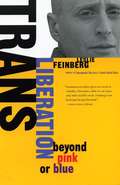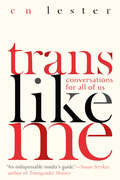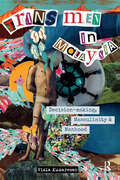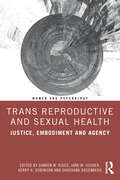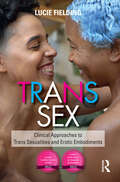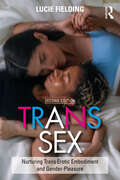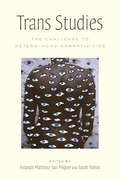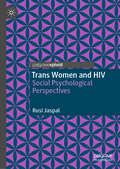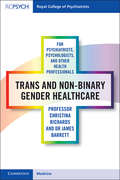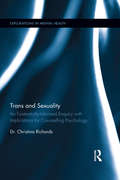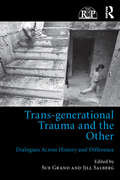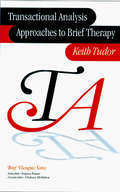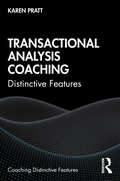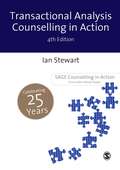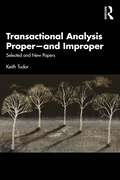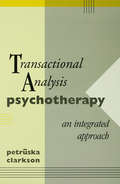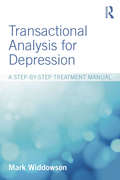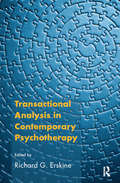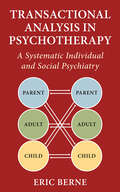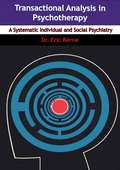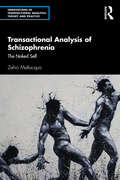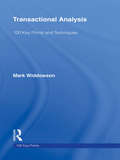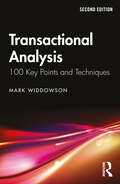- Table View
- List View
Tranquil Prisons
by Erick FabrisAntipsychotic medications are sometimes imposed on psychiatric patients deemed dangerous to themselves and others. This is based on the assumption that treatment is safe and effective, and that recovery depends on biological adjustment. Under new laws, patients can be required to remain on these medications after leaving hospitals. However, survivors attest that forced treatment used as a restraint can feel like torture, while the consequences of withdrawal can also be severe.A brave and innovative book, Tranquil Prisons is a rare academic study of psychiatric treatment written by a former mental patient. Erick Fabris's original, multidisciplinary research demonstrates how clients are pre-emptively put on chemical agents despite the possibility of alternatives. Because of this practice, patients often become dependent on psychiatric drugs that restrict movement and communication to incarcerate the body rather than heal it. Putting forth calls for professional accountability and more therapy choices for patients, Fabris's narrative is both accessible and eye-opening.
Trans Liberation: Beyond Pink or Blue
by Leslie FeinbergThis wonderfully immediate, impassioned, and stirring book is for anyone who cares about civil rights and creating a just and equitable society.
Trans Like Me: Conversations for All of Us
by Cn LesterA personal and culture-driven exploration of the most pressing questions facing the transgender community today, from a leading activist, musician, and academicIn Trans Like Me, CN Lester takes readers on a measured, thoughtful, intelligent yet approachable tour through the most important and high-profile narratives around the trans community, turning them inside out and examining where we really are in terms of progress. From the impact of the media's wording in covering trans people and issues, to the way parenting gender variant children is portrayed, Lester brings their charged personal narrative to every topic and expertly lays out the work left to be done. Trans Like Me explores the ways that we are all defined by ideas of gender--whether we live as he, she, or they--and how we can strive for authenticity in a world that forces limiting labels.
Trans Men in Malaysia: Decision-Making, Masculinity and Manhood (GENDERING ASIAN SOCIETY)
by Vizla KumaresanCutting across the disciplines of trans gender studies and psychology, this book examines the psychological decision-making process behind twenty-three Malaysian trans men’s journeys navigating masculinity from childhood through adulthood. Using interviews and grounded theory methodology, the author analyses how trans men reclaim and redefine a form of resilient masculinity that seeks to divorce itself from patriarchal definitions, done through the exploration of relationships with their identities and de-linking male identity from masculinity. The book examines how trans men redefine their masculinity while maintaining proximity to femininity. Trans men unpack expectations of masculinity from Malaysian perspective on race and gender, to centre their decision-making on their own values and beliefs.
Trans People's Partnerships
by Tam SangerTo what extent are contemporary relationships shaped and limited by the social and legal discourses surrounding them? Are people becoming freer to live the lives they desire or are they manipulated subtly into these very desires? Might the insights gained through exploration of intimate partnerships, as they are currently being lived and negotiated, transform how we perceive gender, sexuality and intimacy? Do we need to think differently about how we come to be who we are, and thereby rethink how we relate to ourselves and others? These are just some of the questions thatthis bookaddresses in considering the narratives of trans people and their partners and in proposing 'the ethics of intimacy', or the rethinking of intimate selves in order to increase freedom from domination and governance. "
Trans Reproductive and Sexual Health: Justice, Embodiment and Agency (Women and Psychology)
by Damien W. Riggs Kerry H. Robinson Jane M. Ussher Shoshana RosenbergFocusing on reproductive and sexual justice, this important book explores in detail both the challenges that trans people face when negotiating reproductive and sexual health in restrictive social contexts, and their agency in advocating for change. Chapters cover a breadth of topics such as intimacy, sexual violence, reproductive intentions, sexuality education, oncology, and pregnancy, introducing readers to the latest research in the field as well as key emerging concepts. The authors identify core principles for trans reproductive and sexual justice, providing a broad overview of what is currently succeeding and what can be built on going into the future. Trans Reproductive and Sexual Health offers a comprehensive exploration that is essential reading for academics and students in psychology, sociology, gender studies, and related areas, as well as clinicians and policy makers, offering direct implications for professional audiences working in health and social care.
Trans Sex: Clinical Approaches to Trans Sexualities and Erotic Embodiments
by Lucie FieldingDespite the increasing visibility of trans and non-binary folx in media, political representation, and popular culture, their sexual lives and erotic embodiments are woefully under-attended-to in both scholarship and clinical practice. The aim of this book is to equip providers with both conceptual frameworks and concrete tools for better engaging their trans, non-binary, and gender expansive clients in pleasure-centered discussions of sexual health. Challenging the dominant images of trans sexualities that appear in the existing literature, such as an emphasis on avoiding gender dysphoria, the preservation of sexual function, or on sexual losses that may arise as a result of transition pathways, Trans Sex offers a pleasure-positive approach to working with trans clients. Providing concrete clinical practices and practical activities that utilize social justice, intersectional trans feminism, and radical queer theory as key conceptual frameworks, this groundbreaking text is designed to be accessible to a wide range of providers. This book draws on Fielding’s experiences as both a trans client/patient and as a therapist to shift and expand the conversation and includes contributions from other trans and non-binary providers working at the intersection of gender-affirmative care and sexuality. Trans Sex seeks to move trans sexualities from the margins of gender-affirmative clinical practice, to center pleasure, and to spark creativity and empathic attunement within the client-provider relationship. Whether they be mental health or medical providers, trainees, or seasoned practitioners in gender-affirmative work or sexualities, readers will be able harness creative strategies to enhance their practice and become more imaginative providers.
Trans Sex: Nurturing Trans Erotic Embodiment and Gender-Pleasure
by Lucie FieldingThis radically re-visioned and expanded edition of Trans Sex offers a joyously pleasure-centered approach to nurturing trans erotic embodiment and finding gender-pleasure in the body.Trans Sex challenges limiting models of gender-affirming care that focus on resolving gender dysphoria, and preserving sexual function, or highlight sexual losses that may arise as a result of transition pathways. Grounded in social justice, somatics, and queer theory, this book offers a pleasure-positive approach to working with trans and gender expansive individuals. Building on the groundbreaking concepts introduced in the award-winning first edition, the second edition features new frameworks such as gender-pleasure and a fresh set of experiential activities and illustrative vignettes to bring theory to practice. The final chapter features a new set of contributing trans and gender expansive authors who work at the intersections of sexuality and gender.This book is designed to be accessible to a range of readers. Mental health and medical providers will be able to harness creative strategies to enhance their practice and become more imaginative, ethically curious providers. Trans and gender expansive folks and allies will find tools and strategies for queering sex, circumventing limiting understandings of the erotic, and opening a potential universe of pleasure that celebrates the polymorphous perversity of our bodies.
Trans Studies: The Challenge to Hetero/Homo Normativities
by Sarah Tobias Genny Beemyn Susan R. Rankin Jian Chen Marcia Ochoa Alexandra Rodriguez de Ruiz Valens Keja Nora Butler Burke Lucas Crawford Yolanda Martinez-San Miguel Aren Z. Aizura Sel J. Hwahng Yolanda Martínez-San Miguel A. Finn Enke Pauline Park Jody L. Herman Toby Beauchamp Mickael Chacha EnriquezFrom Caitlyn Jenner to Laverne Cox, transgender people have rapidly gained public visibility, contesting many basic assumptions about what gender and embodiment mean. The vibrant discipline of Trans Studies explores such challenges in depth, building on the insights of queer and feminist theory to raise provocative questions about the relationships among gender, sexuality, and accepted social norms. Trans Studies is an interdisciplinary essay collection, bringing together leading experts in this burgeoning field and offering insights about how transgender activism and scholarship might transform scholarship and public policy. Taking an intersectional approach, this theoretically sophisticated book deeply grounded in real-world concerns bridges the gaps between activism and academia by offering examples of cutting-edge activism, research, and pedagogy.
Trans Women and HIV: Social Psychological Perspectives
by Rusi JaspalThis book explores the social psychological aspects of trans women’s experiences of living with HIV in the UK. Drawing on theories from social psychology, the author provides a fine-grained analysis of the EXTRA Study – one of the first in-depth empirical studies of trans women’s experiences of living with HIV in the UK.Trans Women and HIV: Social Psychological Perspectives examines issues of identity, threat and coping among trans women – a key population in the HIV epidemic – and presents a model for describing and predicting health outcomes in this population. Underpinned by the Health Adversity Risk Model, this book examines the role of psychological constructs, such as identity, risk and stigma, in behaviour and psychological wellbeing. This informative and thought-provoking text is an invaluable resource for scholars, clinicians and students working in the fields of HIV and trans health.
Trans and Non-binary Gender Healthcare for Psychiatrists, Psychologists, and Other Health Professionals
by Christina Richards James BarrettGender diversity is now recognised as simply part of human diversity, rather than being pathological. This shift calls for a need for mental health professionals to adapt their practice when working with trans and non-binary people. Written by two clinicians with significant experience in this field, this book provides practical, everyday advice on what to do when seeing gender-diverse people in both inpatient and outpatient settings. It avoids focusing on academic theory or being overly political and, instead, offers straightforward, useful guidance on common issues clinicians may face, such as which ward to accommodate someone on or which name to use when. Topics include common drug interactions, differential diagnoses, complex case formulation, autistic spectrum conditions, the spectrum of sexualities, surgeries, legal and religious matters, forensic assessment, psychotherapy and mental health diagnoses. Fully relevant to contemporary practice, this is a much-needed guide for busy clinicians seeking immediate, practical and authoritative answers.
Trans and Sexuality: An existentially-informed enquiry with implications for counselling psychology (Explorations in Mental Health)
by Christina RichardsGrounded in cutting-edge qualitative research, Trans and Sexuality explores the sexuality of people who do not identify with the gender that they were assigned at birth. Arguing that whilst splitting members of the trans community into distinct groups might seem like a reasonable theoretical procedure, the pervasive assumption that group membership impacts on the sexuality of trans people has unduly biased opinions in this highly contested, yet dramatically under-researched area. Moreover, whilst existing literature has taken a purely positivistic standpoint, or relies on methodology that could be seen as exploitative towards trans people, Richards is careful to place the real-life experiences of trans research participants at the heart of the work. Showing that sexuality extends beyond the bedroom, this forward-thinking book touches on topics such as identity, sexuality and the intersections between the two. Richards takes a cross-disciplinary approach and considers the sexuality of trans people within the contexts of psychiatric and psychological settings, including Gender Identity Clinics, as well as in the broader contexts of cultural and community settings. The implications of the research at hand are also explored with respect to counselling psychology and existentialist philosophy. Trans and Sexuality will appeal to academics, researchers and postgraduate students in the fields of gender and sexuality, counselling, sociology, psychotherapy, psychology and psychiatry. It will be of particular interest to those seeking an in-depth and up-to-date overview of ethics and methodologies with people from marginalised sexualities and genders.
Trans-generational Trauma and the Other: Dialogues across history and difference (Relational Perspectives Book Series)
by Sue Grand Jill SalbergOften, our trans-generational legacies are stories of 'us' and 'them' that never reach their terminus. We carry fixed narratives, and the ghosts of our perpetrators and of our victims. We long to be subjects in our own history, but keep reconstituting the Other as an object in their own history. Trans-generational Trauma and the Other argues that healing requires us to engage with the Other who carries a corresponding pre-history. Without this dialogue, alienated ghosts can become persecutory objects, in psyche, politics, and culture. This volume examines the violent loyalties of the past, the barriers to dialogue with our Other, and complicates the inter-subjectivity of Big History. Identifying our inherited narratives and relinquishing splitting, these authors ask how we can re-cast our Other, and move beyond dysfunctional repetitions - in our individual lives and in society. Featuring rich clinical material, Trans-generational Trauma and the Other provides an invaluable guide to expanding the application of trans-generational transmission in psychoanalysis. It will appeal to psychoanalysts, psychoanalytic psychotherapists and trauma experts.
Transactional Analysis Approaches to Brief Therapy: What do you say between saying hello and goodbye? (Brief Therapies series)
by Mr Keith Tudor`This book, edited by Keith Tudor (who is also one of the ten contributors) is excellent reading for a number of reasons: for those who know nothing about TA, it is a highly informative and readily accessible introduction. For those who read or studied it some time ago, it is an excellent refresher. I am impressed by the diversity of people and applications of TA, and the developments outlined in this book are, certainly for me, cause for hope because, as well as offering frameworks for making 'simple' sense of humans in action - and human inaction - TA is a complex and profound system that offers people a way of solving the problems of the present, re-evaluating the struggles of the past, and reshaping the future with permission and power based on a greater sense of self' - Nurturing Potential `I wholeheartedly recommend this book to all therapists as enriching and interesting reading' - European Association for Transactional Analysis Newsletter `It is a book which would offer helpful introductions to both the practice of transactional analysis, and the attitude needed when planning brief therapy of any kind' - The Jounal of Analytical Psychology Of all the approaches to therapy, transactional analysis is arguably one of those most suited to time-limited work. At a time when short-term therapy is increasingly dominant as a form of practice, Transactional Analysis Approaches to Brief Therapy provides an insightful guide which both informs and challenges. Rather than a single theory, TA has developed as a group of four schools which share a common philosophy, but place different emphasis on what occurs during the therapeutic process. Written by therapists at the leading edge of developments in TA, the book presents and differentiates each of these four approaches. Through transcripts and commentaries, it shows how theory applies to practice, for example in treating post-traumatic stress or in achieving a one-session cure. The book also includes a useful glossary of TA terms, as well as an appendix of Eric Berne's short script-questionnaire. In some ways critical of the zeitgeist of short-termism and the commercial pressures for therapy to be brief, the book seeks a balance between the challenge TA offers as an actionistic approach to quick and efficient therapy and the importance of relationship in therapy which is time-conscious. It will be enlightening reading for all those training and those already trained as therapists and counsellors in TA.
Transactional Analysis Coaching: Distinctive Features (Coaching Distinctive Features)
by Karen PrattThis important book distils the essence of developmental Transactional Analysis (TA) frameworks that are most useful to bring alive professional coaching competencies. Karen Pratt offers clear outlines of TA frameworks as well as describing how they are applied in coaching, with snippets of coaching conversations as illustrations of the theory in practice. Pratt highlights key TA frameworks in enough detail to be easily grasped but with a focus on application in coaching and other developmental conversations. A TA approach powerfully guides coaches in their listening and questioning. TA is not used as a coaching ‘technique’ – it offers psychological understanding of human beings and the meaning they make of who they are in the world. Such awareness is key for both professionals and clients in meaningful partnerships for development. Transactional Analysis Coaching will be key reading for professionals working within present-centered contracts for change – coaches, trainers, facilitators, supervisors, teachers, mentors and managers – seeking to understand how TA can impact their development. It will be of great interest to coaches in training and will provide a useful resource for clients in their ongoing development.
Transactional Analysis Counselling in Action (Counselling in Action)
by Dr Ian StewartSAGE celebrated the 20th Anniversary of the Counselling in Action in November 2008. To view the video - click here ----------------------------------------------------- Praise for the First Edition: `Ian Stewart has made the difficult link between theory and practice clear without being patronizing. This is valuable for everyone interested in TA since many concepts can only be fully assimilated when linked to actual examples. Even if you are not in clinical practice, this book would be a useful addition to your library and, for anyone in training or beginning practice, this is required reading' - Group Relations Transactional Analysis Counselling in Action, Third Edition meets a demand for a clearly-written step-by-step account of the process and practice of using transactional analysis to promote personal change. --------------------------------------------------------- This book retains the successful overall structure and organisation of the popular earlier editions, but has been fully revised. Key features of this new edition include: " concise, "hands-on" descriptions of current techniques and concepts in transactional analysis, presented in an accessible style that is immediately useful to the practitioner " the sequence of chapters ordered to reflect successive stages in the typical process of therapeutic change using transactional analysis. This assists in building understanding and application of transactional analysis step by step, in the order that is likely to arise during actual psychotherapy or counselling " expanded discussion of the protective procedure known as "closing the escape hatches" (no-suicide, no-homicide, no-go-crazy decision), including possible contra-indications " a single extended case history that runs through the book to illustrate practice and theory " "Key Ideas" panels which provide summaries of the main ideas that are described in each section or chapter " "Self-supervision sequences" offering suggested checklists of questions that readers can use in appraising their own work with clients. In this revised Third Edition of his bestselling guide, Ian Stewart offers trainee and practising psychotherapists and counsellors an introduction to the core concepts and basic techniques of transactional analysis. Ian Stewart is Co-Director of The Berne Institute, Nottingham. He is accredited by the ITAA and the EATA as a Teaching and Supervising Transactional Analyst.
Transactional Analysis Proper—and Improper: Selected and New Papers
by Keith TudorTransactional Analysis Proper—and Improper: Selected and New Papers offers a critical reading of transactional analysis (TA), which analyses, deconstructs, and reconstructs its foundational theory.Keith Tudor’s work is detailed, informative, and critical, and written with deep affection for TA and its founder, Eric Berne. Beginning with its philosophical foundations, Tudor considers TA’s ontological assumptions about the essence of human beings, its method and methodology, and its treatment philosophy. A series of chapters then review and advance TA’s theory of transactions, ego states, life scripts, and psychological games, and the book concludes with two chapters which both honor TA’s traditions and look forward to what TA might do differently.This book offers a unique ‘insider but independent’ perspective on transactional analysis. It will be essential reading for students and practitioners of transactional analysis and encourages free, independent, and critical thinking about TA and its place in the world.
Transactional Analysis Psychotherapy: An Integrated Approach
by Petruska ClarksonTransactional Analysis Psychotherapy: An Integrated Approach is the first advanced clinical textbook for many years, written for psychotherapists and counsellors who use the theory and techniques of Transactional Analysis in their practice or who are interested in expanding their repertoire. Clarkson provides a comprehensive guide to goal-setting and clinical planning for every stage of treatment. Not only a practical textbook relevant to modern developments in supervision, but one which makes a new and original contribution to ways of thinking about transference and countertransference, the theory of self and the process of psychotherapeutic change.
Transactional Analysis for Depression: A step-by-step treatment manual
by Mark WiddowsonTransactional Analysis for Depression is the first research-based, transactional analysis psychotherapy manual. Developed from the author’s research into TA therapy for depression, the book also draws upon a wide range of contemporary research findings relating to depression and its treatment. Mark Widdowson provides the reader with a solid understanding about the nature of depression and clear guidance about how to provide effective psychotherapy for depressed clients. The book is a step-by-step guide to therapy, from the point of first contact through to ending, and covers: The theory and practice of TA therapy Understanding factors which maintain depression Conceptualising depression using Transactional Analysis Original material on the mechanisms of therapeutic change Optimising the psychotherapy process Key therapeutic processes in the therapy of depression Tailoring the therapy to client needs An introduction to neuroscience and the medical treatment of depression Complete with an additional resources section, including downloadable material designed to be given to clients to enhance the therapeutic process and strengthen the working alliance, Transactional Analysis for Depression provides structured, practical guidance to TA theory for therapists in practice and training.
Transactional Analysis in Contemporary Psychotherapy
by Richard G. ErskineAfter fifty years of development and refinement in Transactional Analysis (TA), the theory of methods and the actual methods have changed considerably from those originally published by Eric Berne. Many concepts and methods have emerged and been subject to clinical experimentation, some have been refined and expanded and some are no longer used. This book includes contributions from several authors, each of whom presents his or her unique focus on how TA is used in their psychotherapy practice. This book will address the therapeutic effectiveness of various methods in TA and will cover a variety of topics such as unconscious experience, transference-countertransference, the therapist's transparency, transgenerational scripts, trauma and regression, psychological games, the self-destructive client, an integrative approach to the psychotherapy of obsession, gender psychopolitics, and psychotherapy from a social-cognitive perspective. It is written for both psychotherapists and counsellors who want to learn and refine their knowledge of contemporary TA methods that are most effective with today's clients.
Transactional Analysis in Psychotherapy: A Systematic Individual and Social Psychiatry
by Eric BerneIn this groundbreaking work, psychiatrist Dr. Eric Berne introduces a new method for understanding and analyzing human behavior, known as transactional analysis or "TA", which examines the interactions, or "transactions," between individuals and the ways in which they change in response to each other. Core to TA is the thesis that humans, as social organisms, are capable of adapting and changing in response to others. Though developed more than a half century ago, TA continues to shape the field of psychiatry and remains required reading for anyone investing the subject.
Transactional Analysis in Psychotherapy: A Systematic Individual and Social Psychiatry (Condor Bks.)
by Dr Eric BerneOriginally published in 1961, this book outlines a new, unified system of individual and social psychiatry that were introduced in the United States around that time with remarkable success in various hospitals and other psychiatric establishments. Essentially designed for group therapy, this approach is now used by institutions, group workers, and in private practice with neurotics, psychotics, sexual psychopaths, psychosomatic cases, and adolescents.Transactional analysis begins its program by initiating the individual patients into the theory upon which the treatment is based. First attaining a measure of self-knowledge through private sessions with the analyst, the patient then meets with other patients in group therapy, participating in a series of personally meaningful relation-ships in which he becomes increasingly aware of the cause and nature of his illness, preparing at the same time to overcome it."A comprehensive method of treatment that has no precedent in its concreteness of structure without at the same time diminishing the dynamic quality of the treatment....No one to my knowledge has presented such a new approach."--Dr. Milton Schwebel, Professor of Education, New York University
Transactional Analysis of Schizophrenia: The Naked Self (Innovations in Transactional Analysis: Theory and Practice)
by Zefiro MellacquaIn Transactional Analysis of Schizophrenia: The Naked Self, Zefiro Mellacqua presents a full assessment of the relevance and value of transactional analysis in understanding, conceptualizing and treating schizophrenia in contemporary clinical settings. Opening with a review of Eric Berne’s ideas, Mellacqua applies theory to the understanding and psychotherapeutic treatment of people suffering from first-episode schizophrenia and to those already living with more long-lasting psychotic levels of self-disturbance. The chapters address a series of crucial methodological themes, including the need for both intensive and extensive analytic sessions; the therapist’s tolerance of uncertainty and not knowing; the informative quality of both therapist’s and patient’s embodiment(s); the emergence of the transference-countertransference relationship; the link between silent transactions and unconscious communication; dream analysis; and the value of regular supervisions. Mellacqua’s approach incorporates meetings with family and caregivers, as well as emphasising multidisciplinary work with patients in a variety of settings, such as in hospitals, outpatient clinics, and psychiatric home treatment. The book is illustrated with engaging clinical case studies throughout, which illuminate the schizophrenic experience and provide examples of how these tools can be used to help patients. Transactional Analysis of Schizophrenia demonstrates how those who suffer from acute schizophrenia, especially those at their very first episode of psychosis, can make an effective recovery and live a satisfying life through the therapeutic application of transactional analysis. It will be essential reading for transactional analysts, psychodynamically oriented psychotherapists, psychologists, psychiatrists, nurses, social workers, academics and all mental health professionals working with people suffering from schizophrenic psychoses.
Transactional Analysis: 100 Key Points and Techniques (100 Key Points)
by Mark WiddowsonTransactional Analysis (TA) is a versatile and comprehensive system of psychotherapy. Transactional Analysis: 100 Key Points and Techniques synthesises developments in the field, making complex material accessible and offering practical guidance on how to apply the theory and refine TA psychotherapy skills in practice. Divided into seven manageable sections, the 100 key points cover: the philosophy, theory, methods and critique of the main approaches to TA TA perspectives on the therapeutic relationship diagnosis, contracting and treatment planning using TA a trouble shooting guide to avoiding common pitfalls refining therapeutic skills As such this book is essential reading for trainee TA therapists, those preparing for examinations as well as experienced practitioners who will find much practical guidance on the skilful and mindful application of this cohesive system of psychotherapy.
Transactional Analysis: 100 Key Points and Techniques (100 Key Points)
by Mark WiddowsonThe second edition of Transactional Analysis: 100 Key Points and Techniques synthesizes developments in Transactional Analysis (TA) and psychotherapy research, making complex ideas accessible and offering therapists practical guidance on refining TA psychotherapy skills. Divided into seven parts, the 100 key points cover: • The philosophy, theory, methods and critique of the main approaches to TA • New developments and approaches in TA • TA perspectives on the therapeutic relationship • Client assessment, diagnosis and case formulation • Contracting and treatment planning using TA • A troubleshooting guide to avoiding common pitfalls • Refining therapeutic skills Specific updates incorporate emergent approaches in TA, recent developments in the understanding of neurodiversity and current best practice thinking. This book is essential reading for trainee and beginner TA therapists, as well as experienced practitioners looking to update their field knowledge for a skilful and mindful application of this cohesive system of psychotherapy.

